Interview With Carol Anderson

Imagine growing up having to hide who you are at your very core from your friends, your parents—even from yourself. This was Carol Anderson’s experience, growing up gay in the 1960s in a (very) religious household. Thankfully, Carol did, after many detours, find herself—and a loving partner—and wrote a book about her experience several years ago titled You Can’t Buy Love Like That: growing up gay in the sixties. It was my great pleasure to speak with Carol about her early days, about the process of writing the book—at 68!—and about the wonderful work she’s being doing since to support women around the world.
Diane: It’s great to meet you, Carol! We have lots to talk about! I’d like to start with your book and growing up in the sixties as a gay person born into a strict religious Christian background. Can you just tell us about your journey?
Carol: Oppressive religions of any kind are very challenging to live within and then to escape from. As children, we’re defenseless in absorbing the messages we receive from those around us. It was clear in Baptist teachings that loving someone of the same sex was not acceptable. So it was terrifying to fall in love with women even though it made me feel the most happy and alive. But keeping that part of me a secret created emotional distance from everyone I loved. I also lived in fear my parents would find out, which created perpetual anxiety. Surely, I thought God already knew, and that I was on the fast track to hell.
Back then, if you were in a relationship and lived with someone, you had a spare bedroom made up as though one of you occupied it, so guests would assume you were roommates rather than lovers. When people asked me, “Are you seeing anybody?” I would always evade the answer. Then people would try to fix me up with an endless array of blind dates not knowing I actually was with someone but couldn’t share that it was a woman. It was very constraining and stressful.
“I Had Never Calculated the Cost of Staying Hidden”
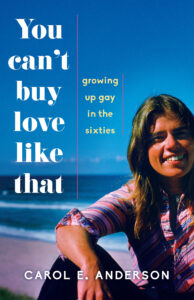 I don’t think I realized until I wrote my book how every single thing in my life was shaped by that secret. I also had never calculated the cost of staying hidden. When I did fall in love with someone, I didn’t feel the freedom to share my joy, and then if we broke up, I couldn’t share my sadness and grief. It was very lonely.
I don’t think I realized until I wrote my book how every single thing in my life was shaped by that secret. I also had never calculated the cost of staying hidden. When I did fall in love with someone, I didn’t feel the freedom to share my joy, and then if we broke up, I couldn’t share my sadness and grief. It was very lonely.
It was mostly the minister at my church who terrorized me as he pounded the pulpit with his fist and screamed about the wrath of God. My parents were much more reasonable and not oriented toward that kind of punishment but were very devout in their beliefs. So there was a big gap between their experience with a God they revered and mine with a God I feared. Because I loved my parents and didn’t want to disappoint them, I kept my love orientation to myself.
This choice was also due to the fact that my father became disabled when I was four, so my mother supported our family, taking care of my father, brother and me. I thought she had enough to worry about, without the knowledge that her daughter was gay. In the 1960’s such news would bring shame on the whole family. There was no one I could talk to—no gay advocates, no support groups, no gay friends. And my own negative stereotypes had been fully formed by then. In my distorted view, all gay women rode motorcycles and smoked cigarettes and were nothing like the person I saw myself to be. That made it harder to imagine myself finding a partner who I could make a life with.
“I Questioned Whether Life Was Worth Living If I Couldn’t Be My Authentic Self”
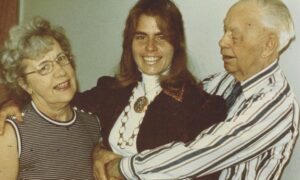 Diane: One of the things that struck me was that you didn’t know you were gay. Anytime you had feelings for a girl or a young woman, you didn’t want to look at those feelings and ran to a guy.
Diane: One of the things that struck me was that you didn’t know you were gay. Anytime you had feelings for a girl or a young woman, you didn’t want to look at those feelings and ran to a guy.
Carol: Oh yeah. I rejected myself way before anybody else did. It was impossible to acknowledge that I could be gay because in my mind, my life would be over. I questioned whether life was even worth living if I couldn’t be my authentic self and would always be reviled by the society in which I lived. Writing the book helped me see and admire that, in the end, I had the courage to stay true to myself, even in the face of all of the oppression, anxiety and fear. I can remember the day I realized that, in order to survive, I had to choose between God and myself, and to be free, I had to choose me. I couldn’t rely on a God who would hate me for being who I am. It wasn’t until my dad died when I was 27 that I knew I had to come out to my mother if we were going to have a real relationship.
Diane: Your parents were so dear in so many ways. And when you came out to your mother—WOW!! For a woman who herself had been indoctrinated and had a different vision for her daughter whom she loved so much. Do you want to talk about that a little bit?
“I Could Have Trusted Her with the Truth Earlier. I Was Just Too Afraid”
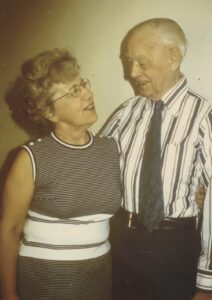 Carol: Sure. I give my mother so much credit because she was in her 70’s in 1977, when I came out to her. When I left that evening I wondered if she’d ever call again or what would happen. It was probably two weeks before I heard from her, but she finally called and said, “I want you and Linda to come over. I don’t expect you to change my mind, and I don’t expect to change yours. But I don’t want to live in fear of something I don’t understand.” My mother had always communicated best with me through letters. While writing the book, I reread the 150 missives she wrote to me in college. It was then I could clearly hear the deep love she always had for me and that I could have trusted her with the truth earlier. I was just too afraid.
Carol: Sure. I give my mother so much credit because she was in her 70’s in 1977, when I came out to her. When I left that evening I wondered if she’d ever call again or what would happen. It was probably two weeks before I heard from her, but she finally called and said, “I want you and Linda to come over. I don’t expect you to change my mind, and I don’t expect to change yours. But I don’t want to live in fear of something I don’t understand.” My mother had always communicated best with me through letters. While writing the book, I reread the 150 missives she wrote to me in college. It was then I could clearly hear the deep love she always had for me and that I could have trusted her with the truth earlier. I was just too afraid.
Diane: Her phone call to you really got to me. She actually was so open-minded, right?
Carol: Yeah, she really was. My mother’s father died when she was 15, and she had to quit school and go to work to support her family. When I look around and see 15-year-olds today, I think, Oh my God, how on earth did she do that? She’d worked so hard her whole life and then when she finally got married and had some support, my dad got sick. In spite of the challenge of his illness, my parents remained devoted to each other and consistently reminded me about the importance of finding a mate who had character. In letters to me, they always acknowledged my own character as a reminder of who I was and who to look for. I’m happy to say I ultimately found the person my parents would admire and we have had a joyful and loving union for twenty-two years—she just happens to be a woman.
“‘Close’ to Me Meant Let’s Dig in and Go Deep”
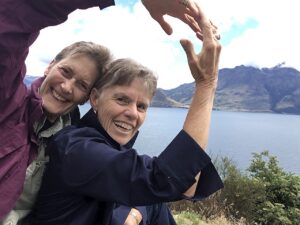 In the end, when my mom was dying. she said to me, “I didn’t need for you to be straight to be a better person than you are. I needed that for me,” which was a powerful and stunning admission on her part. It was the acknowledgement I’d waited to hear my whole life, and it confirmed that she truly saw who I was and that she was proud of me. It was her most meaningful and final gift.
In the end, when my mom was dying. she said to me, “I didn’t need for you to be straight to be a better person than you are. I needed that for me,” which was a powerful and stunning admission on her part. It was the acknowledgement I’d waited to hear my whole life, and it confirmed that she truly saw who I was and that she was proud of me. It was her most meaningful and final gift.
Being very pragmatic, she wasn’t someone who sat down and had heart-to-heart talks. My great aunt had years before suggested to her I might be gay and rather than bring it up with me, she held that secret until the night I came out to her. Yet, she consistently proclaimed to want a closer relationship. “Close” to me meant let’s dig in and go deep and find out what’s really happening. To her, I think it meant just spending more time together. Every time I’d try my version of closeness and ask her an important question, she’d say, “Oh, look, honey, it’s snowing outside,” or ask, “How did you like the pork chops we had for dinner?”
Diane: She didn’t want that close.
Carol: No, she didn’t. I think it scared her. She just wanted some peace in her life and loving relationships that didn’t evoke conflict. Writing the book deepened my love and appreciation for all that my mother did to enable our family to survive. I could see in retrospect how much she loved me and, in spite of our differences around religion, she never turned away. I wish we might have found a way to capture the closeness we both desired, not just in letters, but in person. In spite of the gap, we had a special bond.
“I Went to See a Psychic, Who Said to Me, ‘Your Mother’s Right Here’”
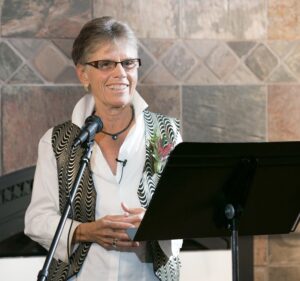 After all my decades of living, both she and my dad remain the two people I most admire. After my mother died, I went to see a psychic, who said to me, “Your mother’s right here,” and described her characteristics. Then she said, “She wants you to know that she was wrong about the afterlife and that I had been her teacher.” I thought, I don’t know what to believe here, but I’ll take that.
After all my decades of living, both she and my dad remain the two people I most admire. After my mother died, I went to see a psychic, who said to me, “Your mother’s right here,” and described her characteristics. Then she said, “She wants you to know that she was wrong about the afterlife and that I had been her teacher.” I thought, I don’t know what to believe here, but I’ll take that.
Diane: Of course. I’ve had experiences with mediums that could not be explained in any “rational, earthly way.” How old were you when you wrote the book?
Carol: I was 68.
Diane: What made you, at 68 say, “I’m writing my story?”
Carol: Well, I always wanted to write, and I’d taken workshops here and there, but when I flew up, which was my word for retiring, because “retiring” felt like I was falling asleep rather than just taking off. Back when I was a Brownie, they had a “flying up ceremony to move on to Girl Scouts. So I thought, well, I’ll just borrow that for this time of my life.
Diane: I love that. That’s great.
Carol: So, I went back to school for my MFA and started writing the manuscript that became my book. I’d never written anything of significant length until then. It started out being a story about my mother, but I couldn’t write about my mother without writing about myself. Then it just evolved into the story I ended up telling.
“When People Approach Life with a Rigid Set of Standards Cloaked in Self-righteousness, They Are Basically Demanding That You Follow Their Beliefs Rather Than Imagine Yours Might Also Have Value”
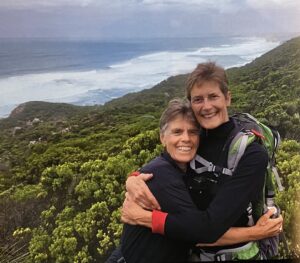 Talk about a transformation! When I was 15 or 20 in the closet hiding from everybody, I never imagined in a million years that I would one day write a book that would be on Amazon for the global community to see. I knew then that I was really okay. That it wasn’t I who was screwed up, but it was the world. And anyone who had a problem with my lifestyle now would have to do their own $100,000 worth of therapy because I’d already done mine.
Talk about a transformation! When I was 15 or 20 in the closet hiding from everybody, I never imagined in a million years that I would one day write a book that would be on Amazon for the global community to see. I knew then that I was really okay. That it wasn’t I who was screwed up, but it was the world. And anyone who had a problem with my lifestyle now would have to do their own $100,000 worth of therapy because I’d already done mine.
Diane: They should pay you back. Right?
Carol: I think so.
Diane: I got my MFA at 58. And I’m glad I didn’t get it a day sooner, honestly. There’s something about doing things like that when you’re of a certain age that just makes it all more special. Why do you think that is?
Carol: I think perspective is a huge part of it. If I’d written that book in my thirties, it would likely sound like the rant of the century. Certainly, after years of therapy, multiple travel experiences, and exposure to different cultures, I came to see the world as the complex and multifaceted place it is. Everybody has a set of values and beliefs they have been taught based on their family of origin, the society in which they live, and the people who have influenced them. When people approach life with a rigid set of standards cloaked in self-righteousness, they are basically demanding that you follow their beliefs rather than imagine yours might also have value. I think as an older person, I see the nuance and complications of human relationships which has given me greater compassion for everyone, including myself.
“So Many Great Things Happen in Life Because Women Have Taken the Initiative to Do Them”
 Having my own business as an organizational consultant for thirty years also led me to see things from a systems view rather than just through my personal lens. When you look at the world that way, you see how social norms have been reinforced for ions and that it takes a herculean effort to change them. To be happy, I needed be true to myself as an individual and then work to change societal beliefs a few people at a time. I found I could appreciate my parents and respect their attachment to religion without having to accept their beliefs as my own. I guess that’s what it means to individuate and become an adult in your own right.
Having my own business as an organizational consultant for thirty years also led me to see things from a systems view rather than just through my personal lens. When you look at the world that way, you see how social norms have been reinforced for ions and that it takes a herculean effort to change them. To be happy, I needed be true to myself as an individual and then work to change societal beliefs a few people at a time. I found I could appreciate my parents and respect their attachment to religion without having to accept their beliefs as my own. I guess that’s what it means to individuate and become an adult in your own right.
Diane: Tell us about Rebellious Dreamers.
Carol: By the time I turned 50, I had enough perspective to see that so many great things happen in life because women have taken the initiative to do them. Yet their voices and aspirations were often dismissed by men in positions of power whether it was in business, art, government, or the private sector. Women had been excluded from all these arenas either because of laws, social norms, or due to lack of time and resources. Early on, most women are responsible for child care, supporting their husbands, or taking care of elderly parents and the occasional stray cat. Their dreams are often diminished by their felt sense of responsibility for everyone else.
“The Idea Was to Show Grantees That Other Women Believed in Them”
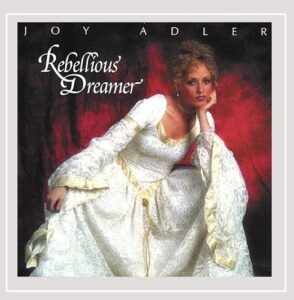 I wanted to create a space where women who had a dream could be supported by a group of women who knew the challenges they faced and could help them navigate their vision through a small grant and, more importantly, by having a mentor to help them succeed. So on my 50th birthday, I had a big party and invited all my friends and asked them to donate to this new project. I got about 25 women together and chose the ones whose eyes lit up when I shared my idea. Most of us were in our 50s at the time. None of us had ever had anyone help us and we wanted to change that for women coming behind us. The idea was to show grantees that other women believed in them and that they could achieve something really important with just a bit of a lift.
I wanted to create a space where women who had a dream could be supported by a group of women who knew the challenges they faced and could help them navigate their vision through a small grant and, more importantly, by having a mentor to help them succeed. So on my 50th birthday, I had a big party and invited all my friends and asked them to donate to this new project. I got about 25 women together and chose the ones whose eyes lit up when I shared my idea. Most of us were in our 50s at the time. None of us had ever had anyone help us and we wanted to change that for women coming behind us. The idea was to show grantees that other women believed in them and that they could achieve something really important with just a bit of a lift.
The first woman who applied, was an aspiring singer who needed to make a demo CD to further her musical journey. She’d learned how to sing by listening to albums of Barbara Streisand, while locked in her room by an abusive father. We gave her a grant of $9,000. She wrote all of her own music, named the album Rebellious Dreamers and made the CD. Shortly after, she got a gig on Princess Cruises for which she won an award as singer of the year. So that was our first really huge success.
Through the years we gave grants to artists, film makers, and eventually provided seed money for a dreamer to open a coffee shop in Seattle. She now has three cafés.
“It Was by Far One of the Most Profound Experiences of My Life and Gave Me A Visceral Sense of Sisterhood That Crossed Continents and Language Barriers through the Power of Love”
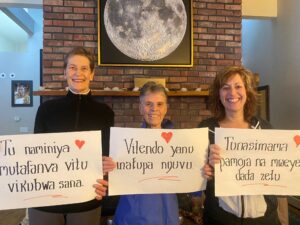 In 2010 our work with Rebellious Dreamers expanded to support groups of women rather than just individuals. This idea was inspired by meeting Chingwell who’d been born in the United States when her parents, who were from the Democratic Republic of the Congo (DRC), attended a university in Iowa. A neighbor was so taken with Chingwell as a baby, she started a trust fund for her so she could return to the U.S. and go to college. When she graduated, she started a non-profit called First Step Initiative whose mission was to provide micro loans to women back in her home country. Members of Rebellious Dreamers saw an opportunity to impact multiple women by donating money to their organization earmarked for micro loans. Through Chingwell we were able to provide 150 loans to women to start small businesses —everything from selling baked goods on the street to starting a grain business.
In 2010 our work with Rebellious Dreamers expanded to support groups of women rather than just individuals. This idea was inspired by meeting Chingwell who’d been born in the United States when her parents, who were from the Democratic Republic of the Congo (DRC), attended a university in Iowa. A neighbor was so taken with Chingwell as a baby, she started a trust fund for her so she could return to the U.S. and go to college. When she graduated, she started a non-profit called First Step Initiative whose mission was to provide micro loans to women back in her home country. Members of Rebellious Dreamers saw an opportunity to impact multiple women by donating money to their organization earmarked for micro loans. Through Chingwell we were able to provide 150 loans to women to start small businesses —everything from selling baked goods on the street to starting a grain business.
It was thrilling to see the impact such a small grant could make to women there. Since a major value of our organization was to have a personal connection with our dreamers, we took a trip to the DRC to meet the women. It was by far one of the most profound experiences of my life and gave me a visceral sense of sisterhood that crossed continents and language barriers through the power of love.
Diane: Amazing.
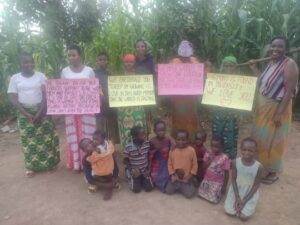 Carol: Meeting such smart and passionate women led us to fund a second effort in the DRC, entitled the Women Rising Legacy Project, which is focused on buying land for women to farm so they can feed their families. Rebellious Dreamers paid for the first hectare and assisted in the design to create a collaborative environment for the women to work together and ultimately to create their own nonprofit to sustain it.
Carol: Meeting such smart and passionate women led us to fund a second effort in the DRC, entitled the Women Rising Legacy Project, which is focused on buying land for women to farm so they can feed their families. Rebellious Dreamers paid for the first hectare and assisted in the design to create a collaborative environment for the women to work together and ultimately to create their own nonprofit to sustain it.
Getting anything done there is extremely challenging because of language barriers, limited resources, and the scarcity that leads to land grabs and other daunting realities but the outcomes are exhilarating. The first year the women were on the land, they grew over 2,000 pounds of food that helped to feed three villages. We are now in the process of buying a second hectare.
Diane: That’s all so exciting!
“The Writing Journey for Me Has Created a Buffet of Feelings That Range from Elation to Terror”
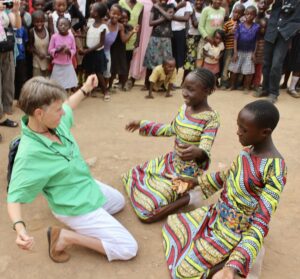 What’s next for you?
What’s next for you?
Carol: Well, after finishing the book, writing has become a passion of mine. So now I’m really trying to learn more about Flash non-fiction. I’d ultimately like to write a Flash memoir entitled “I’m Not Afraid of Dying, I’m Afraid of Missing the Point.” Looking at the world in its current state, it seems we’ve strayed quite a bit from “the point,” and it would be fun to explore in depth why we are here. The writing journey for me has created a buffet of feelings that range from elation to terror. I’ve since learned that many writers experience the same thing, which makes me feel less daunted.
I also plan to continue our work with the Women Rising Legacy Project by supporting them with funding and consultation as they build their own non-profit to sustain the project into the future. For fun, I’ve started taking piano lessons—something I’ve always wanted to do. And Archer, my spouse, and I continue to discover great travel destinations. We hope to go to the Galapagos this year and to Greece.
“I Appreciate My Mother’s Way of Always Looking for A Place Where She Could Make A Difference”
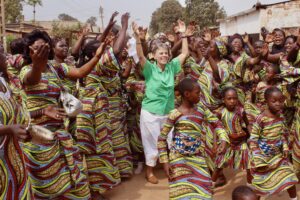 One thing my mother taught me, in spite of all her hardships, was that there’s always someone worse off than you. Though she had a very limited income, she always gave 10% to the church. She would also find people who were having a rough time and put a $5 bill in an envelope along with a note that read, “White lilacs for the soul” to offer encouragement. It was her way of saying sometimes you have to do something nice for yourself when things are hard. I appreciate my mother’s way of always looking for a place where she could make a difference, large or small. She has left that as a legacy to me—one I’m proud to take up.
One thing my mother taught me, in spite of all her hardships, was that there’s always someone worse off than you. Though she had a very limited income, she always gave 10% to the church. She would also find people who were having a rough time and put a $5 bill in an envelope along with a note that read, “White lilacs for the soul” to offer encouragement. It was her way of saying sometimes you have to do something nice for yourself when things are hard. I appreciate my mother’s way of always looking for a place where she could make a difference, large or small. She has left that as a legacy to me—one I’m proud to take up.
Diane: That’s so spot on. And you know what? We are not here to judge what’s small or big. What may seem small to us, might spur a big change. I love that way of being in the world—looking for a place to make a difference.
Thank you so much, Carol, for spending this time with me.
Carol: Thank you so much for this.
As always, I’d love to hear from you. Please write a comment or send me an email.
See you soon!
XOXOXO
Diane



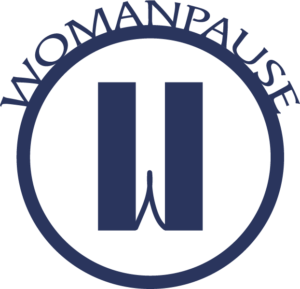
Fantastic! Thank you, Diane and Carol, for rocking the depths of what it takes to stand in your truth and LOVE! DEEP LOVE!
Thank YOU, dear Meg! DEEP LOVE right back at you!
What a powerhouse!!! Great interview with Carol Anderson!
Thanks so much, DeAnna! Carol is amazing!!